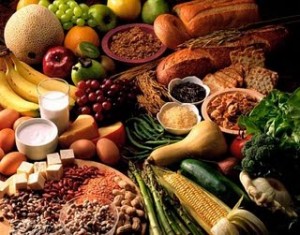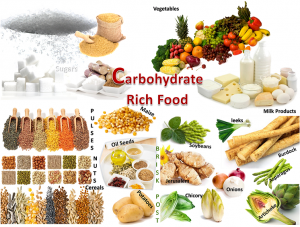The Carbohydrate Phenomenon
It is common practice for people to label carbohydrates as the reason we are getting fatter and less healthy. You may have heard the blanket statement that ‘carbohydrates make you fat!”, however as you read on you will discover that this statement is misleading. The reason why carbohydrates are getting bad press is because:
- They are eating the wrong types of carbohydrates. More and more Australians are consuming carbohydrates that are highly processed, nutrient deficient and high in sugar and other artificial ingredients
- They are not eating carbohydrates when they need them and are eating far too many when they don’t.
The secret is to eat the right type of carbohydrate at the right time!
Where do you find carbohydrates?
Carbohydrates are found in a wide variety of foods from bread, rice, breakfast cereal, fruits and vegetables to desserts, potato chips and fizzy drinks. Some carbohydrates are highly processed and refined while others are more natural, wholegrain and complex (1).
What carbohydrates do?
Carbohydrates major function in the body is to provide energy or fuel. In fact many of the body’s vital organs, including the brain, nervous system and red blood cells must have a constant supply of carbohydrates to keep working (2). When we eat carbohydrate containing food, our body breaks it down into its simplest form called glucose or sugar. This sugar enters the bloodstream and consequently increases blood sugar levels. Your body uses this glucose to provide energy and/or can be stored in your muscles and liver as glycogen, with any excess being stored in your fatty tissue (1). It is important to maintain glycogen levels during and after exercise (2). Although muscles are predominately protein, they need fuel to power the contractions of the muscles filaments and the best and most efficient fuel is carbohydrate (2).
Short term effects of low carbohydrate diets
If you are a person who is always rushed, skips meals or avoid carbohydrates your body may not receive sufficient carbohydrates. The common thought is that if you reduce your energy intake and/or cut carbohydrates from your daily eating plan you will force your body to activate fat stores as an alternative energy supply. Unfortunately this theory is not true. Without sufficient glucose, your body will break down muscle and other tissue to produce glucose in your liver (1). For people trying to lose weight this may be a good thing as the scales will show a decrease, however this loss is largely due to water and muscle loss not fat loss. When you reduce your bodies muscle mass unfortunately you decrease your metabolism (the rate at which your body functions) meaning your ability to burn fat is significantly reduced, hindering your weight loss success (2). Also for every gram of carbohydrate you store you store three grams of water (2) so you can imagine how much weight will disappear when you reduce or eliminate carbohydrates from your daily food intake.
Long term effects of low carbohydrate diets
The long term consequences of your body making glucose instead of consuming carbohydrates, is that it can cause a build-up of waste products called ‘ketones’ leading to Ketosis. Symptoms include general tiredness, abrupt or general weakness, dizziness, headaches, confusion, abdominal pain, irritability, nausea, vomiting and smelly breath. Also your heart may not be able to function to its full ability using Ketones as its main source of fuel (1).
Ketones make the blood acidic and in severe cases Ketosis can be fatal, particularly for pregnant women, unborn babies, and for people who have diabetes.
So, not eating any carbohydrates is bad for you!
Carbohydrates and weight control
Weight gain is caused by consuming too many kilojoules (calories), whether they are from carbohydrates, protein or fat. A diet high in complex carbohydrates such as fruit and vegetables, wholegrains and moderate in fat will result in your best chance for weight loss. It is when you consume high energy dense foods your body has no choice but to store the extra energy as fat. Alcohol can also contribute to fat accumulation as it is surprisingly high in calories, yet provides no nutrition for the body, therefore all of the calories from alcohol consumption become stored.
A diet containing good carbohydrates will also assist in combating hunger pangs as they are slowly realized in the body. These carbohydrates are referred to as low glycemic index (GI) carbohydrates (please refer to our previous article on Glycemic Index).
A Simple rule to follow when eating carbohydrates
When eating carbohydrates eat them “from the earth” with no refining or processing! It is impossible to avoid all added sugar; your goal should be to minimize large amounts of added sugar. Try to eat naturally by limiting the amount of pre-packaged and canned food and as a result you will be consuming good carbohydrates, that fight off illnesses, allow you to feel fuller for longer and they will provide your body with the fuel that will stop you feeling tired, nauseous and hungry.
Keep in mind that Kilojoules (kJ) count in weight control. It is the total number of kilojoules you consume that matters in weight control, NOT where the calories come from i.e. whether there calories come from fat or carbohydrate.
So please don’t be tempted by the myth that carbohydrates are bad – they are an essential part of healthy eating!
References
- Jobling, Andrew. Eat chocolate, drink alcohol and be lean and healthy. Dingley, Australia: Hinkler Books, 2004.
- Saxelby, Catherine. Nutrition for life. South Yarra, Australia: Hardie Grant Books, 2002.



